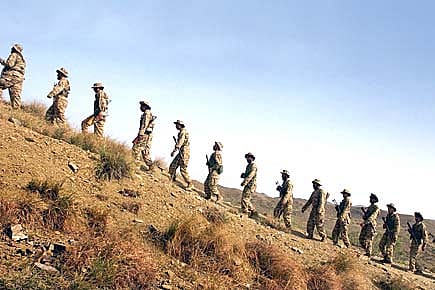Taliban at the Gates

A real menace, more of these fighters have slipped into Kashmir than first thought
When the police arrested Babar Waseem Wardug in Kupwara along the Line of Control (LoC) in Kashmir, he had been separated from his group. His feet had swollen because of incessant walking through snow, and his fingernails had turned blue from the cold. After all, he'd travelled a long way to cross over to Kashmir to launch fidayeen attacks during India's polls.
Wardug is just 17, and the fact that he comes from Pakistan's tribal area of Bajaur has worried the security forces in Kashmir. He has told the police that there were nine other men with him who are now in Kashmir somewhere, waiting for a chance to wreak havoc. Also, that there were 30 other men who had crossed over via some other passage, even as others waited across the border for their turn. Wardug and most others in his group are from the Taliban.
The police brass has specific information that these Taliban men have entered the valley with the help of Hizbul Mujahideen, the dreaded terrorist organisation that is mostly Kashmiri. "Had they come on their own, we would not have worried so much," a senior police officer tells Open. "But the fact that they have Hizbul support means trouble, since Hizbul already has its network in place inside Kashmir," he says, adding that at least seven of the men who have crossed over are Kashmiri militants from the Hizbul training camp in Pakistan-occupied Kashmir.
According to a top intelligence officer, the Taliban leadership had approached both Lashkar and Hizbul for support in sending armed men across. "But the Lashkar refused since it has ideological differences with Taliban," he says. In the last week of February, the Taliban is believed to have approached the Hizbul chief, Syed Salahuddin, and he was asked to 'fall in line'; and on 3 April, the Lashkar chief, Hafiz Mohammed Saeed is said to have lashed out at the Hizbul in Lahore for towing the Taliban line.
Openomics 2026: Continuity and Conviction
06 Feb 2026 - Vol 04 | Issue 57
The performance state at its peak
Wardug is from Bara Malakand area of Bajaur and only speaks Pushto and some Urdu. From a very poor family, he was working in Islamabad as a labourer when militants motivated him to join their 'jihadi' ranks by showing him videos of alleged atrocities committed by the Indian Army in Kashmir. He was trained at Manshera in Pakistan before being sent across.
"It took them three days to reach the LoC and three more to cross over," says a police officer who interrogated Wardug. Along with arms and ammunition, Indian SIM cards for mobile phones (their handler had a radio set as well as satellite phone), they were loaded with fried chicken, pickle and honey; and an almost Hannibalian sense of misguided mission. They would sleep during the day and walk all night, trudging their icy way along. The Macchel area in Kupwara from where they crossed over is fenced. But it was snowed under.
Infiltration around this time is rather unusual, according to a senior army officer who is currently serving along the LoC. "And even if it happens, it has never happened [before] in groups larger than eight or nine people. But this time, their strategy seems to be different," he remarks.
The police, meanwhile, is peeved at the Army for its allegedly ineffective response to its intelligence leads on infiltration. "We had provided the Army with dates and identified the areas from where the militants would sneak in," a senior police officer claims. That the infiltrators should be taken head on was a decision taken at a high-level meeting on 6 April attended by senior police officers and the Brigadier-General-Staff of the Army's 15 Corps.
The police also claims to have supplied the Army with evidence (extracted from a Hizbul guide arrested recently) of a group of 28 Taliban fighters who had managed to cross over from the Gurez sector. "At first the Army denied it, but later they were provided with proof which they could not deny," says the officer.
That LoC vigilance needs beefing up is not in doubt. Over the last two weeks, 17 terrorists and eight army soldiers have died in gun battles. A night before the high-level meeting in Srinagar, two Army soldiers and a terrorist died in a fierce battle between a joint group of the army and the police's Special Operations Group, and intruders in the Maidanpora forest of the Kupwara sector.
On heightened alert now, the security forces are combing the Lolab area along the LoC for infiltrators. Police sources believe that apart from trying to thwart peaceful voting in the valley during the forthcoming Lok Sabha election, the Taliban cadre's mandate is to alter the social setup of Kashmir in favour of stringent Sharia laws that have already cast such a shocking shroud of severity over Pakistan's Swat valley.
"We will try to annihilate the Taliban cadre in the border areas only," says another police officer of the Special Operations Group. "But if some of them manage to reach Srinagar, it would be disastrous." He can say that again.
